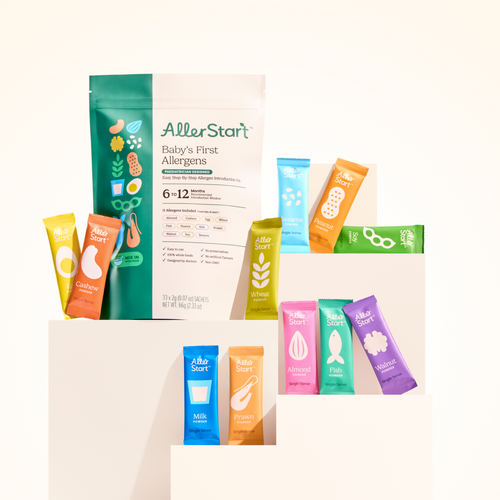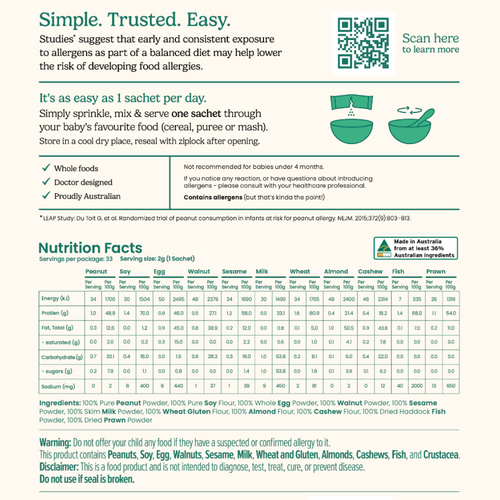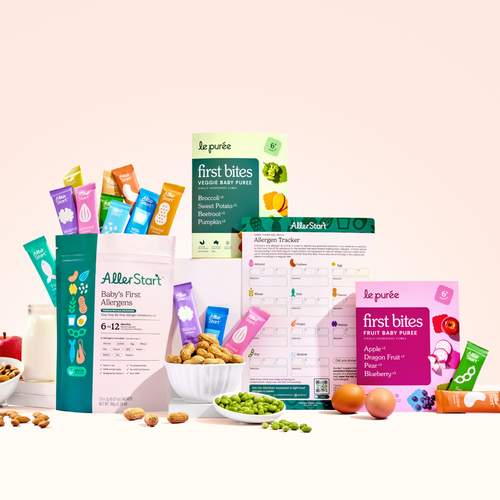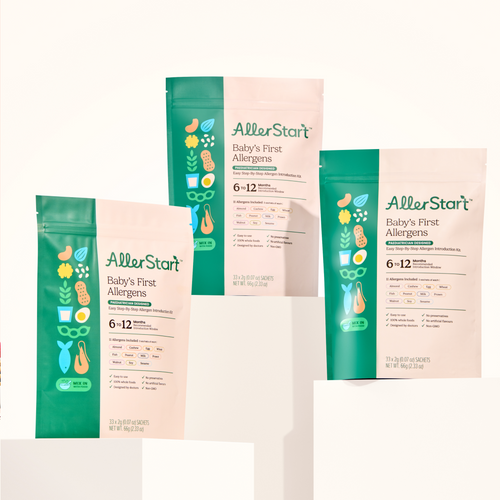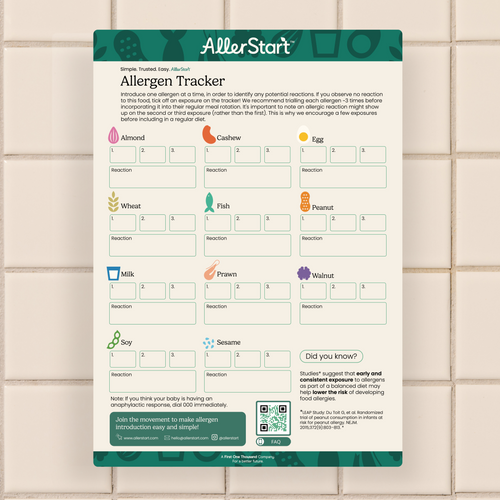By Dr. Chaitanya Bodapati (Dr Chai), dual trained Paediatric Allergy/Immunology Specialist and General Paediatrician.

Introducing foods, let alone allergens, to your child can be an overwhelming thing to consider. How to start them? When to start allergens? How much to give? Gosh even just the mess to come!!!
We know that to reduce the risk of an allergy, the advice is to introduce allergens from 6 months and prior to 12 months. There’s a lot of allergens to work through and most parents feel pressured to start as soon as their child turns 6 months old, BUT this doesn’t work out for everyone.
Your child may not be interested in solids yet, or they may be getting sick lots - there are a lot of factors that play a part. I always say to start slow, and to start when BOTH you and your child are ready!!! Of course the recommendation is to do it early, and I wouldn’t leave it too late, but you don’t need to rush as soon as they hit 6 months to get all the allergens in within the month.
What allergen should you start with?
PICTURED: AllerStart Baby's First Allergens
The most common allergens are dairy, soy, wheat, egg, peanut, tree nuts, sesame, fish, and shellfish. Lots of people seem to want to start with peanut butter as their first allergen, but what about the other common allergens like dairy, wheat, or egg? There’s no right answer as to which you begin with.
I suggest starting with things you already have in your pantry to keep things simple. This also naturally helps you keep it up in your child's diet regularly. We know that starting allergens early is very important, and this message has definitely been delivered to most. We often find that parents feel this is enough, and allergens then aren’t kept up regularly in a child’s diet. It is also important to keep your child eating these allergens regularly, to ensure they don’t end up developing an allergy. So both early introduction AND continued consumption are vital to avoid developing food allergies. The current advice is to keep the allergens up at least a couple of times a week in the diet.
Start allergens in the morning
I always recommend starting a new allergen earlier in the day. That way, if your child has a reaction to a food and needs medical attention, you can see someone during daylight hours.
Make sure it is an age-appropriate food
You want to make sure your child isn’t at risk of issues like choking while trying their allergens. For this reason, you need to consider using an age-appropriate food when starting an allergen. For example, with dairy: a 6 month-old could try some yoghurt, and a 10 month-old could try shredded cheese.
How to start the allergen?
PICTURED: AllerStart Baby's First Allergens
I always suggest giving your child a small amount that you can place straight in their mouth, like a smear or around 1/8 of a teaspoon. If they have no symptoms within 30 minutes, you can slowly increase the amount in 30-minute intervals. You are generally aiming to get to whatever is a serve for your child, based on their age and appetite. If you can’t realistically increase the food every 30 minutes in a day, you can slowly increase the serving over several days. Again, it's about what works best for you.
Essentially, I wouldn’t suggest that you give your child a large amount on their first try of any new allergen. If your child does end up being allergic to a food, larger amounts can increase their chances of having a severe reaction. So always start small, and increase slowly.
Can I mix food together when starting allergens?
You can mix foods together when you are starting allergens, but I would only do one new allergen at a time. Anything that they have eaten before, and been okay with on several occasions, is safe and can be used. To increase the success of starting a new food, I would encourage you to mix it with something they love to eat - for example, you can mix smooth peanut butter in with their favourite pureed fruit. When you mix a new food with something they enjoy, they may be more inclined to try the new flavours.
Baby led weaning vs feeding your child an allergen
I am always happy to consider baby-led weaning for children. But when trying new allergens my preference is to feed them the first few times, until you know that it’s safe. This way, you know that they’ve definitely eaten the food before starting to include it into their diet regularly. It also avoids babies smearing food on their face, which can cause contact rashes and confuse the picture. A contact rash occurs where foods touch the skin - it is not an allergic reaction and is very common in babies.
Sometimes feeding your child isn’t possible, especially as some babies very much go through phases of wanting to feed themselves and refuse to be fed. It always comes down to what works best for you and your child, to minimise stress and to increase your chances of a successful introduction.
When to avoid starting a new allergen?
I would avoid starting a new allergen when your child is unwell (e.g. fevers, coughing, vomiting or diarrhoea). This can lower their threshold, and cause them to react more severely if they are allergic to the food you're trying. It can also be confusing to know if their symptoms are because they're sick, or if they're reacting to a new food.
What to do if you think they are having an allergic reaction
Stop feeding them the food immediately if you think your child is having an allergic reaction. Remove the food from them, clean the area, and wipe down your child with a damp cloth. If they are having any concerning symptoms - like breathing difficulties, coughing, change of voice or cry, drowsiness or floppiness - please call an ambulance as this is a medical emergency and could be life-threatening. Otherwise I would wait until their symptoms settle, and book in to see your local doctor for advice.
Final advice
PICTURED: AllerStart Baby's First Allergens
Introducing allergens can feel like a big step, and it’s completely normal to feel a bit unsure. But with the right information and support, it becomes much more manageable and even empowering. Trust your instincts, take it at a pace that works for you and your child, and remember: you’re doing an amazing job.
If you ever feel uncertain or want a bit more guidance, speak with your GP or a specialist. For more tips on feeding, allergy prevention, and building a positive relationship with food from the very start, follow along at @dr.chai.bodapati_kids_
Dr Chai






